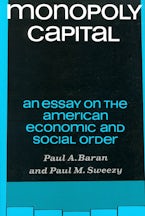
Monopoly Capital
Published by: Monthly Review Press
Sales Date: 1966-01-01
416 Pages, 6.00 × 9.00 in
- Paperback
- 9780853450733
- Published: 1966-01-01
- eBook
- 9781583674000
- Published: 1966-01-01

Published by: Monthly Review Press
Sales Date: 1966-01-01
416 Pages, 6.00 × 9.00 in